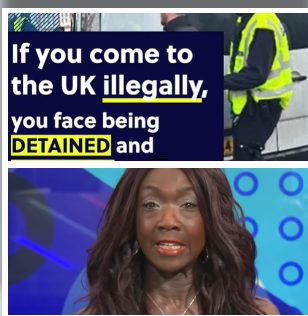‘The people making the rules don’t live in the world you, Nana reacts to home office ads campaign to stop illegal immigrants from entering Uk

‘The people making the rules don’t live in the world you, Nana reacts to home office ads campaign to stop illegal immigrants from entering UK
According to her statements:
The government’s allocation of taxpayer money to tackle illegal immigration has drawn criticism for its approach. Rather than focusing on directly addressing the issue by curbing illegal immigration from non-war-torn or persecuted regions, the government has opted to invest in an advertising campaign aimed at deterring individuals from places like Albania from entering the UK through illegal means. This decision has raised questions about its effectiveness and the reasoning behind it.

Nana argue that the government’s belief that individuals willing to pay smugglers substantial amounts of money would be deterred by such a campaign is misguided. They view it as mere window dressing, intended to create the appearance of taking action rather than actually addressing the problem. Some people feel that the government underestimates their intelligence and finds the campaign to be an insult to their intelligence.
The plan to deter illegal immigration, known as VCCNACK’s plan, has surprised many, as it seems to have been devised by naïve and “woke” civil servants who lack firsthand experience of the situation. The rapid turnover of Robert Generick, who has served as the Minister for Housing, Social Care, and now Immigration within a span of three years, is cited as evidence of the government’s inability to effectively address immigration-related issues.
Generick has stated that the campaign aims to dispel myths propagated by malicious human smugglers. However, critics argue that the campaign’s initial focus on Albania, warning of strict new UK laws, is far from the truth. They assert that both the government and potential migrants are aware that the chances of staying in the UK are close to 100% once they arrive, and that they will receive better care and support than they would in their home countries. Detractors also suggest that it is relatively easy for illegal immigrants to disappear into the informal economy.
The campaign has been criticized as a desperate measure, particularly when prominent figures like Gary Lineker openly criticize the government’s language on immigration. Lineker’s comments have garnered global attention, and despite being funded by taxpayers, he continues to receive recognition and awards for his views. This perceived hypocrisy undermines the credibility of the government’s propaganda-style video aimed at deterring illegal immigration.
Nana argue that Lineker’s actions, such as accepting a sport and human rights award in Italy for advocating for the rights of refugees and migrants, despite Italy’s own concerns about the migrant influx, demonstrate his lack of proximity to the Kent Coast or migrant camps. This distance from the actual situation allows him to freely express his opinions without experiencing the direct consequences of unchecked immigration.
The disconnect between the policymakers and the realities faced by ordinary citizens is a central concern. Many feel that decision-makers are out of touch with the daily struggles and challenges faced by the public. This disconnect is seen as a reason behind the government’s choice to employ a woke advertising agency to create ineffective and costly adverts that potentially serve to guide criminals rather than deter them. Such a perceived misuse of taxpayer money is considered a complete waste.




